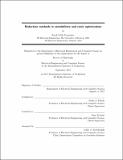Reduction methods in semidefinite and conic optimization
Author(s)
Permenter, Frank Noble
DownloadFull printable version (1.446Mb)
Other Contributors
Massachusetts Institute of Technology. Department of Electrical Engineering and Computer Science.
Advisor
Pablo A. Parrilo and Russ Tedrake.
Terms of use
Metadata
Show full item recordAbstract
Conic optimization, or cone programming, is a subfield of convex optimization that includes linear, second-order cone, and semidefinite programming as special cases. While conic optimization problems arise in a diverse set of fields (including machine learning, robotics, and finance), efficiently solving them remains an active area of research. Developing methods that detect and exploit useful structure-such as symmetry, sparsity, or degeneracy-is one research topic. Such methods include facial and symmetry reduction, which have been successful in several applications, often reducing solve time by orders of magnitude. Nevertheless, theoretical and practical barriers preclude their general purpose use: to our knowledge, no solver uses facial or symmetry reduction as an automatic preprocessing step. This thesis addresses some of these barriers in three parts: the first develops more practical facial reduction techniques, the second proposes a more powerful and computationally efficient generalization of symmetry reduction (which we call Jordan reduction), and the third specializes techniques to convex relaxations of polynomial optimization problems. Throughout, we place emphasis on semidefinite programs and, more generally, optimization problems over symmetric cones. We also present computational results.
Description
Thesis: Ph. D., Massachusetts Institute of Technology, Department of Electrical Engineering and Computer Science, 2017. Cataloged from PDF version of thesis. Includes bibliographical references (pages 255-266).
Date issued
2017Department
Massachusetts Institute of Technology. Department of Electrical Engineering and Computer SciencePublisher
Massachusetts Institute of Technology
Keywords
Electrical Engineering and Computer Science.